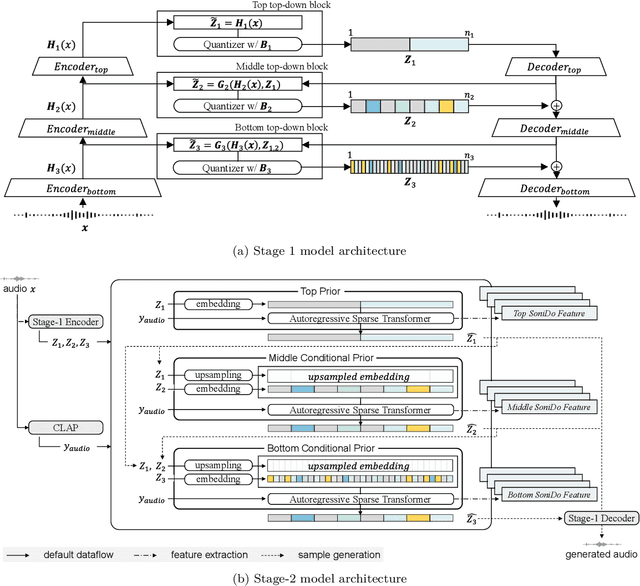WeiHsiang Liao
Music Foundation Model as Generic Booster for Music Downstream Tasks
Nov 05, 2024



Abstract:We demonstrate the efficacy of using intermediate representations from a single foundation model to enhance various music downstream tasks. We introduce SoniDo, a music foundation model (MFM) designed to extract hierarchical features from target music samples. By leveraging hierarchical intermediate features, SoniDo constrains the information granularity, leading to improved performance across various downstream tasks including both understanding and generative tasks. We specifically evaluated this approach on representative tasks such as music tagging, music transcription, music source separation, and music mixing. Our results reveal that the features extracted from foundation models provide valuable enhancements in training downstream task models. This highlights the capability of using features extracted from music foundation models as a booster for downstream tasks. Our approach not only benefits existing task-specific models but also supports music downstream tasks constrained by data scarcity. This paves the way for more effective and accessible music processing solutions.
SQ-VAE: Variational Bayes on Discrete Representation with Self-annealed Stochastic Quantization
May 16, 2022



Abstract:One noted issue of vector-quantized variational autoencoder (VQ-VAE) is that the learned discrete representation uses only a fraction of the full capacity of the codebook, also known as codebook collapse. We hypothesize that the training scheme of VQ-VAE, which involves some carefully designed heuristics, underlies this issue. In this paper, we propose a new training scheme that extends the standard VAE via novel stochastic dequantization and quantization, called stochastically quantized variational autoencoder (SQ-VAE). In SQ-VAE, we observe a trend that the quantization is stochastic at the initial stage of the training but gradually converges toward a deterministic quantization, which we call self-annealing. Our experiments show that SQ-VAE improves codebook utilization without using common heuristics. Furthermore, we empirically show that SQ-VAE is superior to VAE and VQ-VAE in vision- and speech-related tasks.
 Add to Chrome
Add to Chrome Add to Firefox
Add to Firefox Add to Edge
Add to Edge